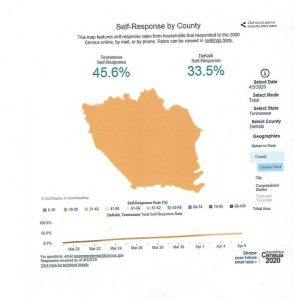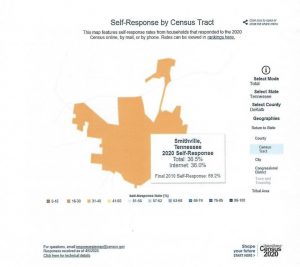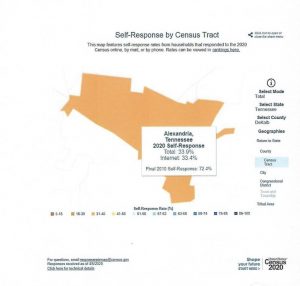April 8, 2020
By: Dwayne Page
If you’re a census slacker and haven’t yet filled out the form for the 2020 head count, the federal government is trying another way to get in touch with you.
Starting Wednesday (today), the U.S. Census Bureau is mailing out paper forms to 65.6 million homes nationally whose residents haven’t yet answered the once-a-decade questionnaire.
According to the U.S. Census Bureau, the DeKalb County response rate at 33.5% is approximately 12% below the Tennessee and national averages. Response rates for the cities are as follows: Liberty-28%, Alexandria 33.9%, Smithville 36.5%, and Dowelltown 39.8%. The final county wide response rate for 2010 was 62.3%.
Most U.S. residents started getting notices about a month ago that they could respond online or by phone. But about 20% of households automatically received a paper questionnaire, either because their area lacks consistent internet connectivity or their neighborhood has a high percentage of people over age 65.
Now the rest of the nation, at least those households that haven’t responded, are getting paper questionnaires.
About a month into the start of the 2020 census for most U.S. residents, the self-response rate is approaching half of all households, with most responding online. Minnesota, Wisconsin, Michigan, Nebraska, Iowa and Virginia are setting the pace with response rates over 50%. But in other states — Alaska, West Virginia and New Mexico — only between a quarter and a third of households have responded.
The Census Bureau’s suspension of field operations between mid-March and mid-April due to the spread of the new coronavirus may be affecting response rates.
The Census Bureau says the current national response rate is on track for what was expected. Because the 2010 census only used paper forms, and the schedule was more compressed, a side-by-side comparison of response rates from the two decades is flawed. But almost a month into the 2010 census, about two-thirds of households had responded.
The 2020 census will guide the distribution of some $1.5 trillion in federal spending and help determine how many congressional seats each state gets in a process known as apportionment.








